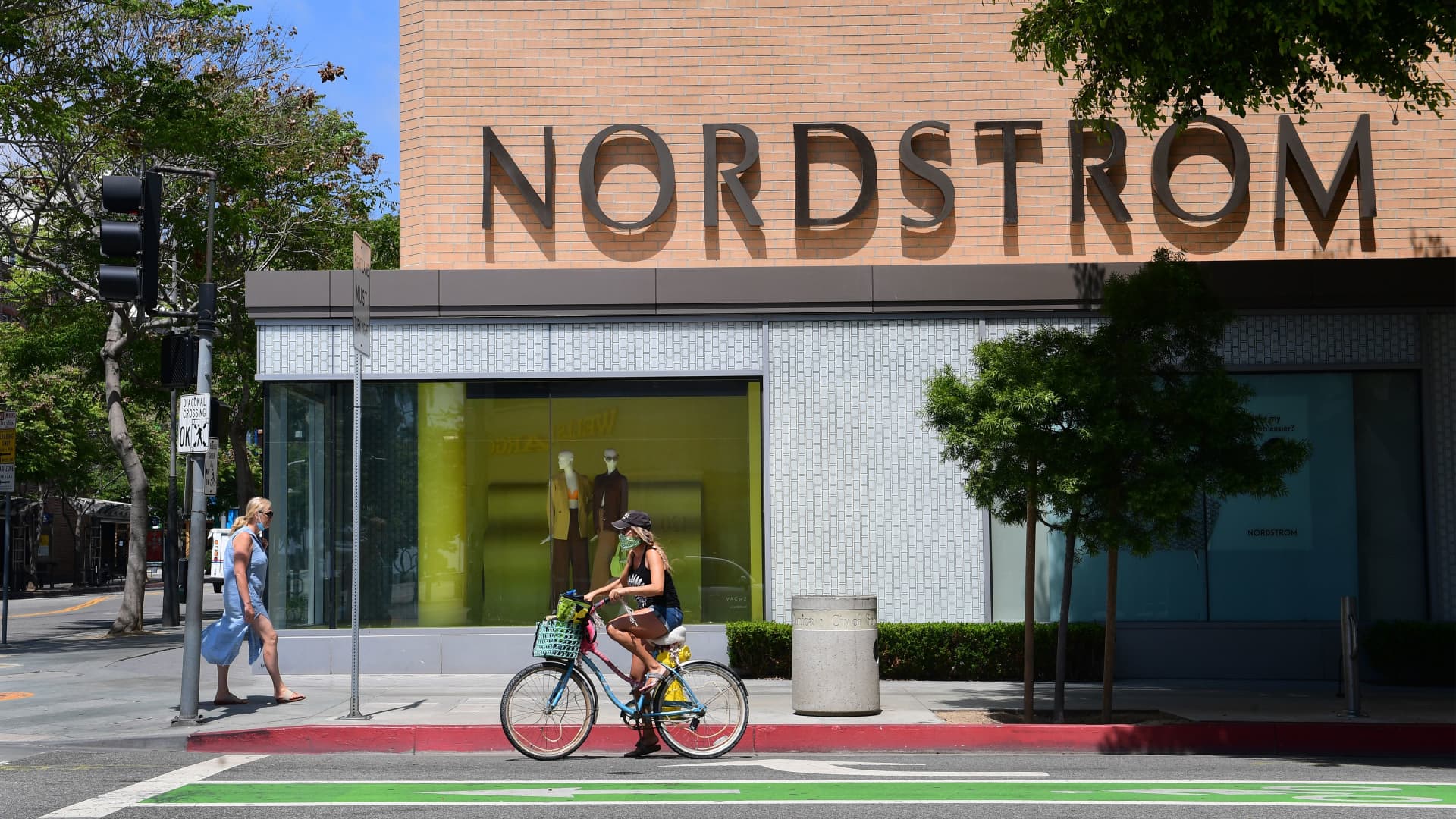Nordstrom on Tuesday reported fiscal first-quarter sales ahead of analysts’ expectations and hiked its full-year outlook, citing momentum in the business as shoppers visited the company’s department stores to refresh their closets with designer brands and shoes.
Nordstrom now sees fiscal 2022 revenue, including credit card sales, up 6% to 8%, compared with a prior range of up 5% to 7%.
It forecasts earnings per share, excluding the impact of any share repurchase activity, in a range of $3.38 to $3.68, up from a prior range of $3.15 to $3.50. On an adjusted basis, it expects to earn between $3.20 and $3.50 a share.
Its shares jumped about 9% in after-hours trading on the news.
The optimistic outlook stands in contrast to retailers like Target, Kohl’s, Abercrombie & Fitch and a slew of others that in recent days dialed back their annual forecasts as supply chain costs and other expenses eat into profits. But Nordstrom’s business also hasn’t been operating in tandem with those other retailers.
Last fall, for example, as many retailers saw their sales rebound to above pre-pandemic levels, Nordstrom was still working to do so. Now, as retailers such as Macy’s lap more difficult year-over-year comparisons, Nordstrom is building off of a lower base.
Chief Executive Officer Erik Nordstrom said the company has been able to capitalize on demand from people who are shopping for “long-awaited occasions” as pandemic restrictions dissipate and invitations resume for weddings, reunions and other social gatherings.
Still, the retailer booked an adjusted per-share loss that was slightly wider than what analysts had been looking for.
Here’s how Nordstrom did in its fiscal first quarter compared with what Wall Street was anticipating, based on a Refinitiv survey:
- Loss per share: 6 cents adjusted vs. 5 cents expected
- Revenue: $3.57 billion vs. $3.28 billion expected
Nordstrom reported net income for the three-month period ended April 30 of $20 million, or 13 cents a share, compared with a net loss of $166 million, or $1.05 per share, a year earlier.
Nordstrom lost 6 cents a share on an adjusted basis, excluding a gain resulting from the sale of the company’s interest in a corporate office building and an impairment charge related to a Trunk Club property. That per-share loss was a penny wider than what analysts had been looking for.
Nordstrom announced Tuesday that it plans to sunset its Trunk Club business, a personal styling platform — somewhat akin to Stitch Fix — that it acquired back in 2014. The company said it will be focusing resources instead on its own styling services available at Nordstrom.
Total revenue, including credit card sales, grew to $3.57 billion from $3 billion a year earlier. That beat expectations for $3.28 billion.
At Nordstrom’s namesake banner, net sales grew 23.5%, exceeding pre-pandemic levels. Net sales at Nordstrom Rack rose 10.3% but were still below 2019 levels, the company said.
Nordstrom Rack, which competes with off-price chains such as TJX, Ross Stores and Macy’s Backstage, has struggled more so during the pandemic to secure merchandise from other retail brands, which it can then sell at a markdown. In April, Nordstrom announced plans to streamline ownership of the Rack business as it brought in a bench of executives with prior experience in off-price retail.
“By increasing our supply of premium brands and fine tuning our assortment to better align with customer needs, we are achieving a better balance of price points at the Rack,” Nordstrom management said in prepared remarks.
Digital sales were flat on a year-over-year basis, as shoppers trimmed their online spending and headed back to stores. E-commerce represented 39% of total sales, compared with 46% a year earlier.
Nordstrom said its urban stores, including its flagship location in New York City, performed the strongest during the quarter, as workers returned offices to nearby office buildings and tourist traffic rebounded. Collectively, urban store sales returned to pre-pandemic levels, the company said.
Chief Financial Officer Anne Bramman said that, so far, the company hasn’t seen inflationary cost pressures result in a pullback of customer spending. On a post-earnings conference call, she said that’s like due to to the “higher income profile and resiliency” of its customers.
Nordstrom ended the three-month period with inventory levels up 23.7% compared with a year earlier, in part because the company ordered extra goods to build a string stock of merchandise ahead of its upcoming, annual Anniversary Sale.
Also on Tuesday, Nordstrom announced it will soon start to sell shoes from Allbirds, making it one of the sustainable sneaker brand’s few third-party retail partners, and said it had authorized a new $500 million buyback.
Correction: This story has been updated to correct that Nordstrom announced on Tuesday it will soon start to sell shoes from Allbirds. An earlier version misstated the timing of the announcement.
